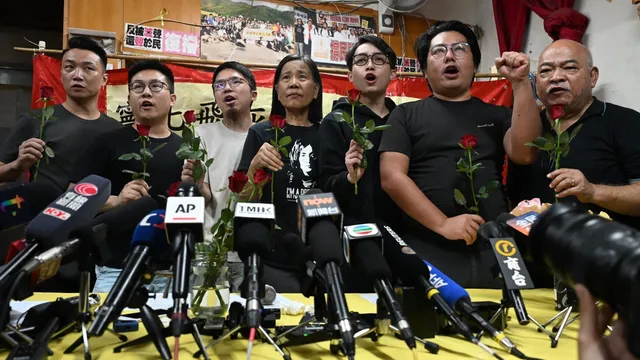
Pro-democracy party disbands amid intense pressure in Hong Kong
2025-06-30 09:03- The League of Social Democrats has disbanded, marking a significant decline in pro-democracy advocacy in Hong Kong.
- Political pressure and repercussions led the party to cease its operations, unable to sustain its activism under the current political climate.
- The disbandment reflects the continuing crackdown on dissent and the shrinking space for civil society in Hong Kong.
Express your sentiment!
Insights
In Hong Kong, the pro-democracy League of Social Democrats announced its disbandment on a recent Sunday, citing immense political pressure as the primary reason for this decision. Founded in 2006, the party had been one of the few remaining opposition voices actively engaging in street protests and advocating for the rights of underprivileged residents, despite facing severe repercussions from authorities since the enactment of the national security law in 2020. This law, imposed by Beijing, has led to the prosecution and jailing of numerous activists, effectively silencing much of the pro-democracy activism that once thrived in Hong Kong. The party’s chairperson, Chan Po-ying, expressed a deep sense of loss and conscience about the disbandment, emphasizing that the decision came after careful deliberation. She acknowledged that the consequences of continuing to operate could be dire for the party’s members, some of whom have already faced warnings regarding possible repercussions if the party remained active. The sentiment within the party reflects a broader atmosphere of fear and caution among the remaining pro-democracy activists who have witnessed a systematic crackdown on dissenting voices in the city over recent years. As Hong Kong continues to face increasing restrictions on freedoms, small businesses linked to pro-democracy sentiments are also under pressure, with reports of inspections and warnings issued against them. This part of the political landscape illustrates the extent of control being exerted over civil society in Hong Kong, as the government intensifies its efforts to suppress any form of dissent. Issues affecting businesses and activists have highlighted the restrictive environment under which Hong Kong citizens now operate, further contributing to a sense of hopelessness within the pro-democracy movement. Chan Po-ying’s acknowledgement that the party has contributed to the pro-democracy climate in Hong Kong, even as it now ceases to exist, underscores both the resilience and the vulnerability of those who continue to advocate for change. The disbandment is not merely a loss for the League of Social Democrats but represents a significant moment in Hong Kong’s ongoing struggle for democratic rights amidst increasing repression from its own government and influences from Beijing. This situation serves as a stark reminder of the difficult landscape that activists must navigate as they seek to voice their concerns for a democratic future in a city that has fundamentally changed over the past few years.
Contexts
The impact of the Hong Kong national security law on civil society is profound and multifaceted, influencing various dimensions of life in the city since its enactment in 2020. This legislation, which aims to curb dissent and establish state control, has resulted in a significant contraction of civil liberties, particularly affecting freedom of speech, assembly, and the press. The law's vague definitions of offenses such as sedition, terrorism, and collusion with foreign forces have instilled fear among citizens, leading to widespread self-censorship and a chilling effect on public discourse. Activists, journalists, and ordinary citizens who express views contrary to the government's narrative now face the constant threat of prosecution, which undermines the very fabric of a pluralistic society. Moreover, the law has catalyzed a substantial transformation within civil society organizations, many of which have been forced to cease operations, migrate abroad, or significantly alter their focus to adhere to legal restrictions. Many prominent NGOs and community groups, particularly those advocating for human rights and democracy, have disbanded or restructured their missions to exclude politically sensitive topics. This has resulted in a significant loss of organized advocacy, which previously served as a voice for marginalized groups and a check on government power. The shrinking civic space also hampers social movements, as potential mobilization becomes increasingly risky for participants. The repercussions of this legal framework extend into the educational and cultural sectors as well. Under the new law, educators are increasingly cautious about the materials they use and the discussions they facilitate, often opting for a sanitized curriculum that aligns with government-approved narratives. This shift not only diminishes critical thinking and the exploration of diverse perspectives in classrooms but also stifles creativity and academic freedom in higher education institutions. Events like art exhibitions, film screenings, and public lectures addressing controversial issues have been canceled or significantly altered to avoid potential legal repercussions, illustrating an imposing climate of fear that extends beyond political activism. Internationally, the national security law for Hong Kong has altered the global perception of the city, often described as a vibrant hub for finance, culture, and free expression. The crackdowns on dissent and the erosion of autonomy have prompted foreign governments and international organizations to criticize China's actions, leading to sanctions and a re-evaluation of trade and diplomatic relationships with Hong Kong. This alteration in the geopolitical landscape could have long-term consequences for Hong Kong's economic prosperity and its role as a bridge between East and West. Consequently, the implications of the national security law are not just local; they resonate globally as they challenge the principles of human rights and civil liberties, raising urgent questions about the future of democracy in the region.